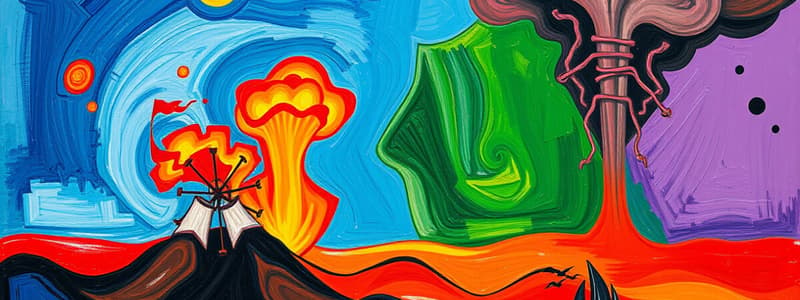Podcast
Questions and Answers
What are natural disasters?
What are natural disasters?
A natural phenomenon caused by natural forces, which can be classified as rapid onset disasters and progressive onset disasters.
What are man-made disasters?
What are man-made disasters?
Disasters caused by identifiable intentional or non-intentional human actions.
Which of the following are categories of man-made disasters? (Select all that apply)
Which of the following are categories of man-made disasters? (Select all that apply)
- Complex humanitarian emergencies (correct)
- Natural disasters
- Technological/industrial disasters (correct)
- Terrorism/Violence (correct)
What is a technological/industrial disaster?
What is a technological/industrial disaster?
What does terrorism/violence refer to?
What does terrorism/violence refer to?
What is a complex humanitarian emergency?
What is a complex humanitarian emergency?
What is risk?
What is risk?
What does disaster risk refer to?
What does disaster risk refer to?
What is exposure in the context of disasters?
What is exposure in the context of disasters?
What is a hazard?
What is a hazard?
What is vulnerability?
What is vulnerability?
Match the phases of a disaster with their descriptions:
Match the phases of a disaster with their descriptions:
Which are the impacts of disasters? (Select all that apply)
Which are the impacts of disasters? (Select all that apply)
What are physical impacts of disasters?
What are physical impacts of disasters?
What are environmental impacts of disasters?
What are environmental impacts of disasters?
What are social impacts of disasters?
What are social impacts of disasters?
What are economic impacts of disasters?
What are economic impacts of disasters?
Flashcards are hidden until you start studying
Study Notes
Natural Disasters
- Caused by natural phenomena; can be rapid or progressive.
- Examples include earthquakes (rapid onset) and droughts (progressive onset).
- Sudden events can have severe consequences on communities.
Man-Made Disasters
- Result from identifiable human actions, either intentional or unintentional.
- Include a range of incidents affecting people and environments.
Categories of Man-Made Disasters
- Technological/Industrial Disasters
- Caused by unregulated industrial practices and insufficient safety standards.
- Terrorism/Violence
- Heightened by the proliferation of nuclear, biological, and chemical technologies.
- Complex Humanitarian Emergencies
- Occur amidst civil or international conflicts, leading to mass displacement and disrupted basic services.
Risk
- Defined as the probability of an event coupled with its potential negative impact.
- Often associated with human capacity to manage or cope with hazards.
Disaster Risk
- Reflects potential disaster losses in terms of lives, health, and community resources.
- Result of the intersection of hazards and community vulnerabilities.
Exposure
- Refers to elements (people, property, livelihoods) at risk from hazards.
Hazard
- A potentially dangerous occurrence or activity leading to loss or damage.
- Includes natural events and human activities that cause disruption.
Vulnerability
- Determined by factors impacting a community’s susceptibility to hazards.
- Encompasses physical, social, economic, and environmental dimensions.
Phases of a Disaster
- Response: Immediate actions post-disaster to reduce harm and damage.
- Recovery: Efforts aimed at restoring normalcy in the aftermath of a disaster.
- Mitigation/Prevention: Strategies to lessen disaster impacts or prevent occurrences.
- Preparation: Planning and training to handle unavoidable events.
Impacts of Disasters
- Physical Impacts: Damage to buildings, infrastructure, and property.
- Environmental Impacts: Effects on ecosystems, soil, water sources, and natural habitats.
- Social Impacts: Consequences on human health, relationships, and community security.
- Economic Impacts: Effects on financial resources, income, commerce, and production systems.
Studying That Suits You
Use AI to generate personalized quizzes and flashcards to suit your learning preferences.




